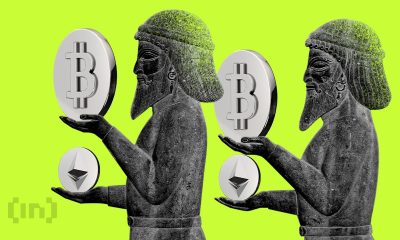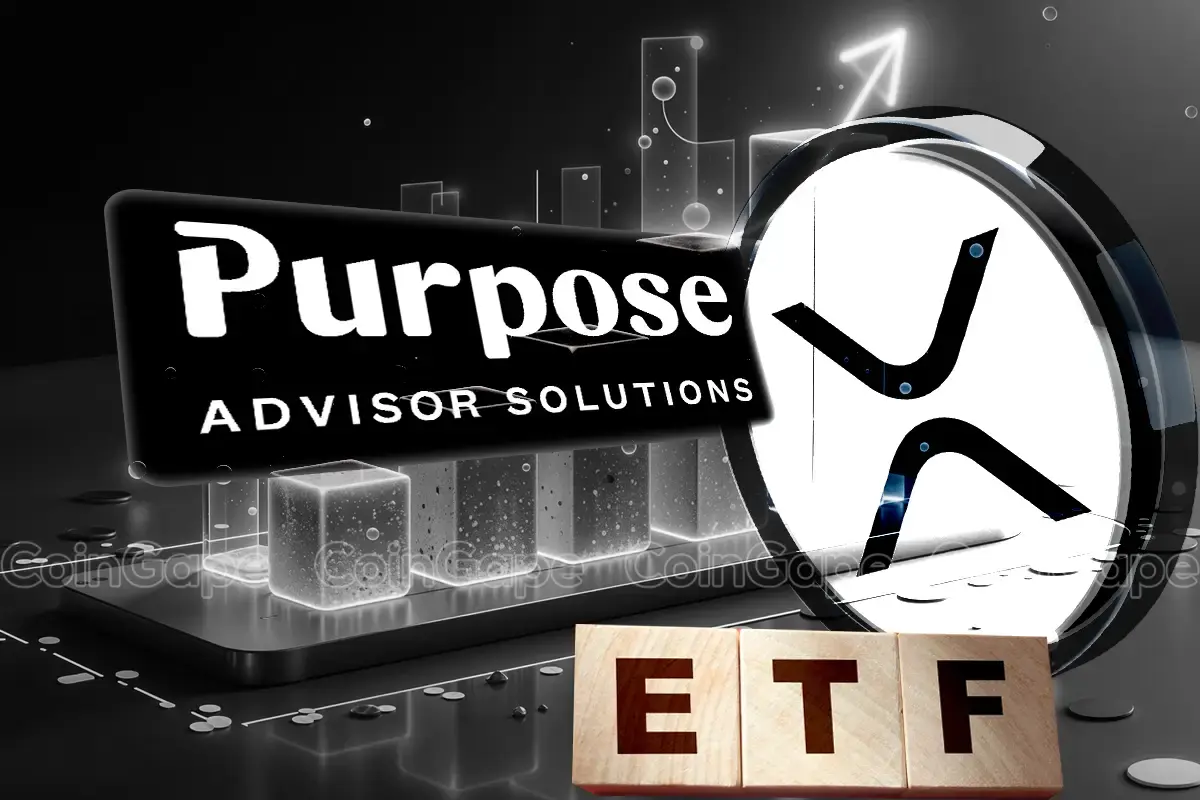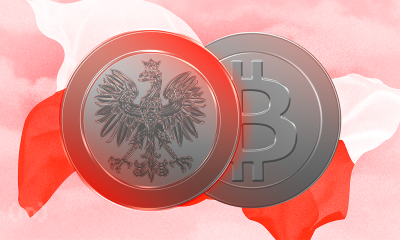Market
How Singapore Became the World’s Most Crypto-Friendly Country

Singapore is a leading country in blockchain technology and cryptocurrency adoption. Its supportive regulatory environment, clear legal guidelines, and strategic position as a global financial hub are among the factors that have made the country so appealing for crypto businesses and innovation.
BeInCrypto spoke with Alex Svanevik, CEO and Co-founder of Nansen, a Singapore-based blockchain analytics firm, to understand what makes the country one of the most crypto-friendly nations in the world.
Singapore Leads Global Ranking for Blockchain Innovation
Countries that prioritize investments in talent, infrastructure, and regulation are positioned to lead in digital innovation and reshape global industries.
In 2024, an Apex report ranked Singapore as the top country in blockchain and crypto technology, achieving the highest score of 85.4. The nation has over 2,400 blockchain-related jobs and 81 crypto exchanges, showing its strong workforce and infrastructure development focus.

The study evaluated countries based on a composite index that considered factors such as blockchain patents, job growth, and the number of cryptocurrency exchanges.
“Singapore has established itself as a global leader in the crypto space due to its progressive regulatory framework, pro-innovation policies, and robust government support for blockchain technology. Clear legal guidelines for digital assets, a favorable tax regime, and active engagement with industry stakeholders create an environment where crypto businesses and blockchain innovations can thrive,” said Svanevik.
The country’s reputation as a global finance and fintech center has also attracted international crypto firms and investors seeking stability and growth opportunities.
A Balanced Regulatory Approach
An intrinsic aspect of Singapore’s success lies in its regulatory framework, which balances consumer protection without stifling innovation.
In 2019, Singapore introduced the Payment Services Act (PSA), a comprehensive licensing regime for Digital Payment Token (DPT) service providers.
The bill encompasses cryptocurrency exchanges and wallet providers. It enhances consumer protection, combats terrorism financing, and strengthens cybersecurity measures within the financial sector.
Alongside this legislation, the Monetary Authority of Singapore (MAS) requires detailed checks on anti-money laundering (AML) and counter-terrorism financing (CTF). Firms must also prove strong cybersecurity practices.
“This risk-adjusted framework promotes technological progress while ensuring financial security and integrity,” Svanevik told BeInCrypto.
These regulatory measures establish guidelines nationwide, facilitating crypto adoption for investors and consumers.
Steering Innovation with Consumer Protection
In safeguarding users against security threats or fraudulent activity, Singapore has also gained a reputation for taking consumer protection very seriously.
For crypto businesses to operate in the country, they must comply with consumer protection laws.
“Singapore prioritizes consumer protection within its crypto sector through stringent regulations. MAS requires DPT services providers to implement robust security protocols and conduct thorough customer due diligence. The Singapore Police Force collaborates with MAS to actively monitor and address fraudulent activities involving digital assets,” Svanevik explained.
In November 2023, MAS announced plans to implement stricter regulations for DPT providers. These regulatory changes required service providers to adapt their operations and business practices to comply with the new regulatory framework.
The MAS implemented these new regulations in two stages. The first stage, which focused on customer asset ring-fencing, disclosures, and risk management controls, came into effect in October 2024.
The second phase will take place in six months.
“Starting June 19, 2025, new regulations mandate that crypto firms perform risk awareness assessments for retail customers to ensure informed decision-making,” Svanevik said.
Specifically, these regulations prohibit licensed firms from offering incentives to attract retail customers. Given the inherent volatility of the cryptocurrency market, they also restrict the use of leverage or derivatives contracts referencing cryptocurrencies as underlying assets with retail investors.
Crypto firms must conduct risk awareness assessments for all existing retail customers before the enactment of the second phase of regulations as a prerequisite for continued service provision.
A Favorable Taxation System
Singapore’s flexible tax regime has also offered significant advantages to crypto investors and businesses.
A notable feature of Singapore’s tax system is the absence of a capital gains tax. In many countries, profits from the sale of cryptocurrencies are subject to capital gains tax, which can significantly impact investor returns.
Singapore’s tax code differentiates personal investments from business activities. Its regime exempts personal cryptocurrency investments from the capital gains tax, providing individual investors with a more favorable tax environment. However, this exemption does not apply to business activities related to cryptocurrency trading.
With the same idea, Singapore exempts digital payment tokens like Bitcoin and Ethereum from transactions using the standard 8% Goods and Service Tax (GST).
This exemption significantly reduces the tax burden on cryptocurrency transactions, making Singapore an attractive destination for cryptocurrency businesses, including exchanges, wallet providers, and other companies operating within the digital asset ecosystem.
Singapore’s taxation system also applies a comparatively low corporate tax rate to businesses.
“A competitive 17% corporate tax rate supports the growth of crypto startups and blockchain enterprises, solidifying Singapore as a global innovation hub,” Svanevik told BeInCrypto.
For reference, the United States has a corporate tax rate of 21%. Estonia, another leading blockchain nation, has a rate of 22%, while South Korea’s rate stands at 27.5%.
DBS Bank as a Vital Player in Digital Asset Adoption
Singapore’s DBS bank has played an instrumental role in creating a national platform for trading digital tokens.
In 2020, DBS launched the DBS Digital Exchange (DDEx), becoming one of the first banks in the world to offer institutional and accredited investors access to cryptocurrency and security token trading.
In September 2022, DBS extended DDEx’s reach to 100,000 of its most influential clientele. The bank enabled accredited clients with at least $246,000 in investable assets to buy, sell, and trade available cryptocurrencies.
Two years later, DBS expanded product offerings to include crypto options trading and structured notes for sophisticated investors. Eligible DBS clients gained broadened access to digital assets while hedging against market volatility and potentially earning yield.
“DBS Bank’s proactive engagement not only bolsters market credibility but also positions Singapore as a model for harmonizing traditional finance with emerging blockchain technologies. This alignment of institutional finance with digital innovation sets a precedent for how global banks can adopt and scale blockchain solutions responsibly,” Svanevik said.
The bank also introduced DBS Token Services, integrating blockchain solutions with core banking operations to streamline digital asset management. The program connects the bank’s functions to an EVM-compatible blockchain, enabling tokenization and smart contracts.
Last May, Nansen disclosed in an X post that it had identified DBS bank as the alleged owner of an ETH whale wallet holding 173,753 Ether, worth $650 million at the time.
“This substantial holding underscores the growing institutional confidence in digital assets, signaling a pivotal shift where traditional financial institutions are increasingly integrating crypto into their core strategies,” Svanevik added.
Given that DBS Bank is well-versed in crypto, this revelation was more of a shock than a surprise.
An Ongoing Series of Initiatives
Singapore continued to lead in blockchain integration with several recent key initiatives.
In 2022, Singapore entered the decentralized finance (DeFi) space with a live test of digital asset trading across liquidity pools. This live transaction, involving tokenized deposits, marked the first industry pilot conducted under the MAS’s Project Guardian.
“Project Guardian, spearheaded by MAS, explores asset tokenization to enhance financial market efficiency through collaboration with industry leaders,” Svanevik said.
Last November, MAS announced adding five new pilot programs on asset tokenization as part of Project Guardian. This was part of a larger effort to develop ways to scale tokenized markets.
“Ongoing industry pilots are advancing asset tokenization across financial sectors, reinforcing Singapore’s role as a blockchain innovation leader,” Svanevik added.
These five industry trials will explore the potential of asset tokenization. They aim to facilitate greater integration across the entire capital markets value chain, encompassing activities such as listing, distribution, trading, settlement, and asset servicing.
This week, the National University of Singapore (NUS), in collaboration with Northern Trust and UOB, announced the launch of a pioneering initiative to tokenize green bond credentials.
This initiative uses blockchain technology to enhance transparency, data integrity, and investor confidence in sustainable investment practices.
It also represents a significant step forward for NUS, making it the first university in Singapore to leverage blockchain technology for environmental, social, and governance (ESG) reporting. This initiative aims to enhance transparency, data integrity, and investor confidence in sustainable investment practices by utilizing blockchain technology.
Collaboration Between Public and Private Institutions
Singapore also actively drives blockchain adoption across both public and private sectors, according to Svanevik.
Toward the end of 2020, the Enterprise Singapore (ESG), the Infocomm Media Development Authority (IMDA), and the National Research Foundation (NRF) launched a $12 million Singapore Blockchain Innovation Programme (SBIP).
This industry-driven initiative aimed to engage nearly 75 companies in developing 17 blockchain-related projects within the next three years, focusing initially on the trade, logistics, and supply chain sectors.
“The Singapore Blockchain Innovation Programme (SBIP) fosters collaboration among government agencies, academic institutions, and private enterprises to enhance blockchain capabilities,” Svanevik told BeInCrypto.
That same year, Singapore’s MAS concluded Project Ubin, a five-stage collaborative project with different financial institutions and industry players to explore using blockchain and Distributed Ledger Technology (DLT) for payments and securities settlements.
In 2023, MAS also developed the Orchid Blueprint, a strategic framework for building a secure and efficient digital money infrastructure. This blueprint outlines key components for the safe and novel use of digital money in Singapore, drawing insights from previous industry trials and emphasizing the value of collaboration between central banks and the private sector.
“Singapore’s proactive approach to regulation, innovation, and collaboration positions it as a global leader in the crypto and blockchain ecosystem,” Svanevik concluded.
As Singapore invests in infrastructure, establishes regulatory clarity, and provides government support, it will likely continue to lead the leadership ranks of global crypto and blockchain innovation.
Disclaimer
Following the Trust Project guidelines, this feature article presents opinions and perspectives from industry experts or individuals. BeInCrypto is dedicated to transparent reporting, but the views expressed in this article do not necessarily reflect those of BeInCrypto or its staff. Readers should verify information independently and consult with a professional before making decisions based on this content. Please note that our Terms and Conditions, Privacy Policy, and Disclaimers have been updated.
Market
BNB Springs Back From $531 With Unshaken Bullish Conviction

My name is Godspower Owie, and I was born and brought up in Edo State, Nigeria. I grew up with my three siblings who have always been my idols and mentors, helping me to grow and understand the way of life.
My parents are literally the backbone of my story. They’ve always supported me in good and bad times and never for once left my side whenever I feel lost in this world. Honestly, having such amazing parents makes you feel safe and secure, and I won’t trade them for anything else in this world.
I was exposed to the cryptocurrency world 3 years ago and got so interested in knowing so much about it. It all started when a friend of mine invested in a crypto asset, which he yielded massive gains from his investments.
When I confronted him about cryptocurrency he explained his journey so far in the field. It was impressive getting to know about his consistency and dedication in the space despite the risks involved, and these are the major reasons why I got so interested in cryptocurrency.
Trust me, I’ve had my share of experience with the ups and downs in the market but I never for once lost the passion to grow in the field. This is because I believe growth leads to excellence and that’s my goal in the field. And today, I am an employee of Bitcoinnist and NewsBTC news outlets.
My Bosses and co-workers are the best kinds of people I have ever worked with, in and outside the crypto landscape. I intend to give my all working alongside my amazing colleagues for the growth of these companies.
Sometimes I like to picture myself as an explorer, this is because I like visiting new places, I like learning new things (useful things to be precise), I like meeting new people – people who make an impact in my life no matter how little it is.
One of the things I love and enjoy doing the most is football. It will remain my favorite outdoor activity, probably because I’m so good at it. I am also very good at singing, dancing, acting, fashion and others.
I cherish my time, work, family, and loved ones. I mean, those are probably the most important things in anyone’s life. I don’t chase illusions, I chase dreams.
I know there is still a lot about myself that I need to figure out as I strive to become successful in life. I’m certain I will get there because I know I am not a quitter, and I will give my all till the very end to see myself at the top.
I aspire to be a boss someday, having people work under me just as I’ve worked under great people. This is one of my biggest dreams professionally, and one I do not take lightly. Everyone knows the road ahead is not as easy as it looks, but with God Almighty, my family, and shared passion friends, there is no stopping me.
Market
XRP Futures Traders Increase Bets on Upside

Over the past week, XRP’s price has remained range-bound amid the broader market’s recovery attempt.
However, with a growing bullish bias toward the altcoin, XRP may be on the brink of breaking free from this range and trending upward. This analysis explains why.
XRP Futures Traders Bet on Upside as Long Positions
The momentum shift towards the bulls has become evident, particularly within the futures market, where long bets on XRP are now surpassing short positions. This is reflected by the token’s XRP’s long/short ratio, which is currently at 1.07.

The long/short ratio measures the proportion of long positions (bets on price increases) to short positions (bets on price declines) in the market.
When its value is below one, it indicates that the number of short positions outweighs long positions in the market, suggesting bearish sentiment or a lack of confidence in the token’s future price performance.
As with XRP, when an asset’s long/short ratio is above one, it means there are more long positions than short ones. It indicates that traders are predominantly bullish on XRP and hints at a higher likelihood of an upward breach of its narrow range.
In addition, XRP’s relative strength index (RSI) has climbed steadily, indicating a gradual rise in demand for the token. The key momentum indicator, at 50.77, currently rests above the neutral line and is in an uptrend.
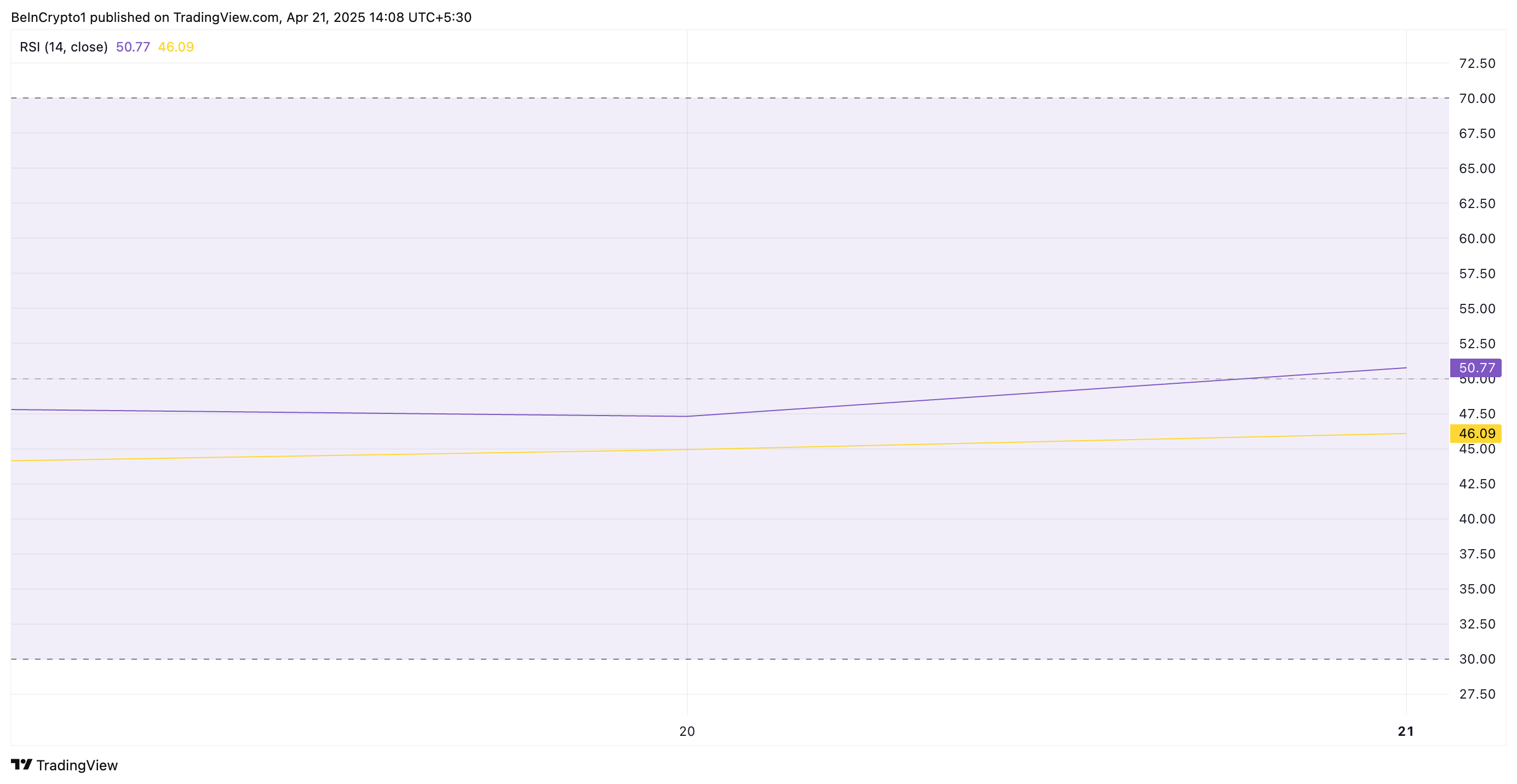
The RSI indicator measures an asset’s overbought and oversold market conditions. It ranges between 0 and 100. Values above 70 suggest that the asset is overbought and due for a price decline, while values under 30 indicate that the asset is oversold and may witness a rebound.
At 50.77, XRP’s RSI signals a shift toward bullish momentum. It indicates that buying pressure is starting to outweigh selling pressure, and the asset may be poised for further price increases.
XRP Eyes $2.18 Resistance as Bulls Look to Push for $2.29
XRP currently trades at $2.13, just 3% away from its next significant resistance level, $2.18. If buying pressure intensifies and the altcoin successfully flips this price point into a support floor, it could trigger further price growth. In this scenario, XRP could potentially climb to $2.29.
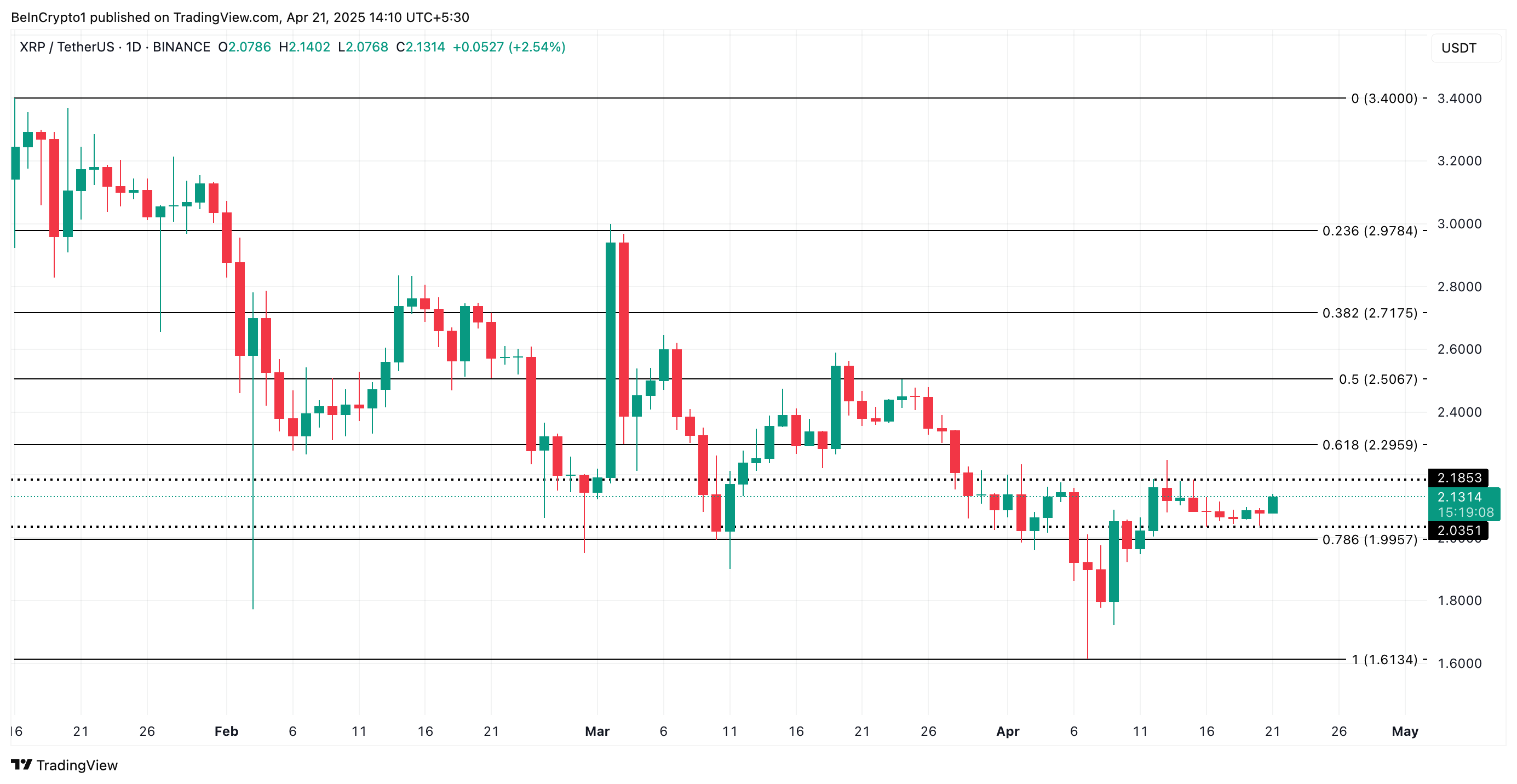
However, if demand weakens and the bears regain control, XRP may remain range-bound. It could even break below the $2.03 support and fall to $1.99.
Disclaimer
In line with the Trust Project guidelines, this price analysis article is for informational purposes only and should not be considered financial or investment advice. BeInCrypto is committed to accurate, unbiased reporting, but market conditions are subject to change without notice. Always conduct your own research and consult with a professional before making any financial decisions. Please note that our Terms and Conditions, Privacy Policy, and Disclaimers have been updated.
Market
Optimism, Aztec, and Huma Finance


The crypto market is attempting a recovery, with Bitcoin (BTC) nearing the $90,000 milestone. Amidst improving sentiment, several startups are launching enticing airdrops, providing crypto enthusiasts with opportunities to engage with budding platforms without initial financial input.
This week, we discuss airdrop participation opportunities from three projects with financial backing from renowned investors.
Optimism
Layer-2 blockchain Optimism is one of the top three crypto airdrops this week. The Optimism crypto airdrop comes after the network raised $267.50 million from key investors such as Andreessen Horowitz, Coinbase Ventures, Paradigm, and IDEO CoLab Ventures, among others.
The airdrop concerns a SuperStacks Campaign, which opened on April 16 and will remain until June 30.
“With many chains building as one, a new network structure is emerging to solve fragmentation in Ethereum. This network is modular, interoperable, and composable by default. We call it the Superchain: and it changes everything,” Optimism explained.
Rewards are in the form of points, awarded for interacting with the projects. Airdrop farmers also get rewarded for providing liquidity to superchains, scalable blockchains combined into a single ecosystem to solve Ethereum fragmentation.
Actual tasks bring 10 EXP (experience points) per $1 of daily liquidity. In the past, Optimism held five airdrops, giving away over 265 million tokens.
“You may be eligible for the 6th airdrop without realizing it. In the system, we collect badges as you perform operations on Optimism. However, since it counts your previous operations when you log in, you may have opened many badges.,” one airdrop farmer explained.
This means even minimal effort could yield rewards. However, participating in the Optimism airdrop does not guarantee future rewards. Instead, it only provides an opportunity to earn points.
Aztec
Another top crypto airdrop to watch this week is Aztec, bringing forth a privacy-focused Layer-2 zero-knowledge (ZK) rollup on Ethereum.
Aztec is backed by $119.1 million in funding from investors such as Andreessen Horowitz (a16z), Paradigm, Consensys, and Coinbase Ventures.
The project has garnered significant attention, following talks of a native AZTEC token and a confirmed retroactive airdrop for early users.
On April 17, the network announced the Aztec Sequencer Form, front-running a public testnet. Interested participants were asked to fill out the form to gain early access to the testnet.
Historically, blockchain projects reward testnet participants with tokens. Based on this, Aztec’s funding and investor backing increase the probability of an airdrop.
Huma Finance
This week, the watchlist also includes Huma Finance, the first PayFi (Payment Finance) network built on Solana. The project focuses on transforming global payment settlements using blockchain technology.
Huma Finance launched the second version of point farming, which is available only on the Solana network. Participants can deposit USDC tokens and earn Feathers (points). Notably, no KYC is needed in this version, and more pools are available.
Recently, the project announced social and deposit quests on Galxe, allowing users to complete these quests and try to win a share of $2,000. Notably, participants should have at least lvl 2 of Web3 Passport.
“Huma 2.0 is The Next Wave! Now anyone can earn real yield and stack rewards, exclusively on Solana. New quest is LIVE on Galxe Quest. Join the PayFi movement for a chance to grab a share of $2000 USDC,” the network shared.
The project also launched a point farming program, in which participants can deposit USDC tokens into one of the pools. For this activity, users must pass KYC.
Meanwhile, Huma Finance boasts up to $46.3 million in funds raised from backers such as HashKey Capital, Circle, ParaFi Capital, and Distributed Global.
Disclaimer
In adherence to the Trust Project guidelines, BeInCrypto is committed to unbiased, transparent reporting. This news article aims to provide accurate, timely information. However, readers are advised to verify facts independently and consult with a professional before making any decisions based on this content. Please note that our Terms and Conditions, Privacy Policy, and Disclaimers have been updated.
-

 Market22 hours ago
Market22 hours ago1 Year After Bitcoin Halving: What’s Different This Time?
-

 Market21 hours ago
Market21 hours agoTokens Big Players Are Buying
-

 Market23 hours ago
Market23 hours agoVOXEL Climbs 200% After Suspected Bitget Bot Glitch
-
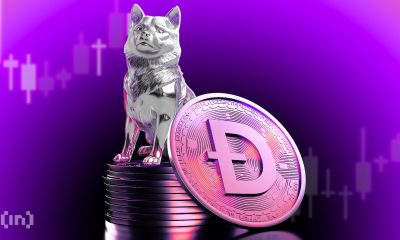
 Market20 hours ago
Market20 hours agoDogecoin Defies Bullish Bets During Dogeday Celebration
-

 Market18 hours ago
Market18 hours agoWill XRP Break Support and Drop Below $2?
-
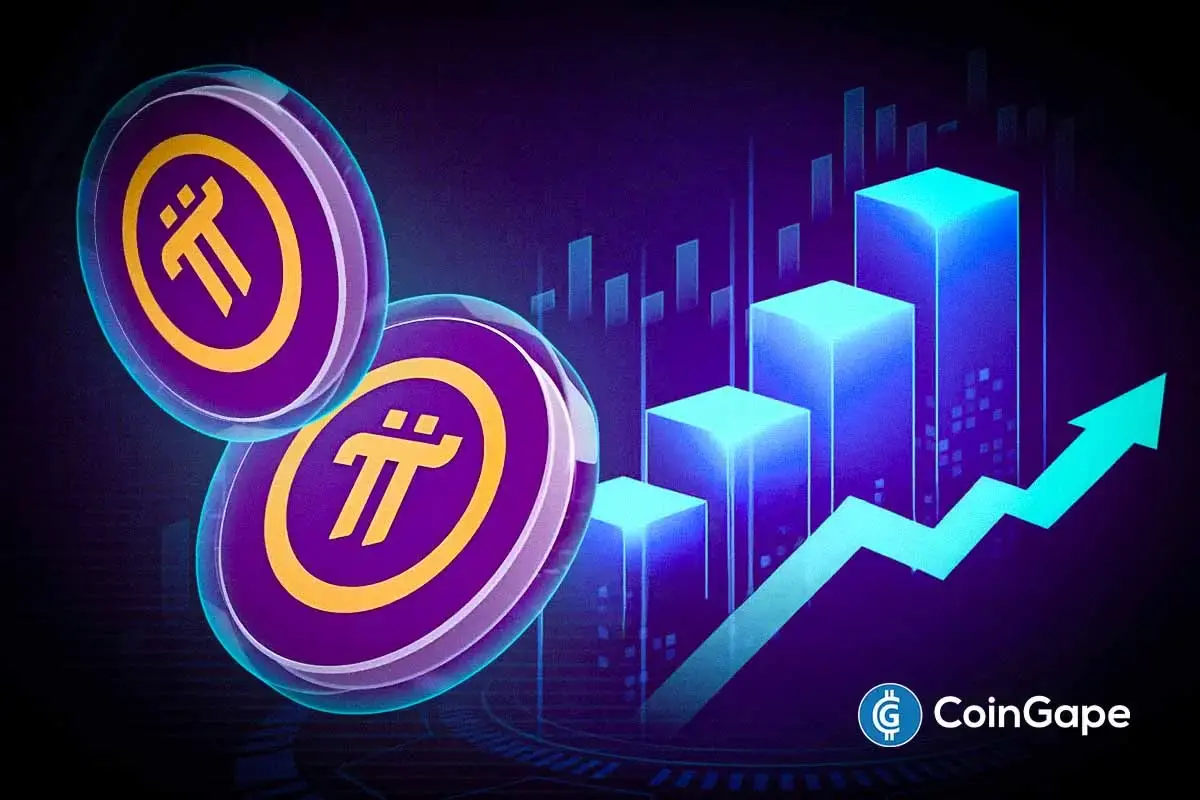
 Altcoin20 hours ago
Altcoin20 hours agoExpert Predicts Pi Network To Reach $5 As Whales Move 41M Pi Coins Off Exchanges
-

 Bitcoin17 hours ago
Bitcoin17 hours agoBitcoin LTH Selling Pressure Hits Yearly Low — Bull Market Ready For Take Off?
-

 Market11 hours ago
Market11 hours agoBitcoin Price Breakout In Progress—Momentum Builds Above Resistance




